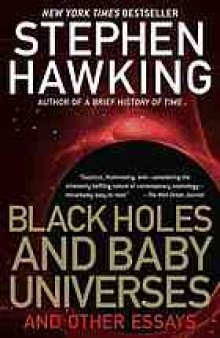 جزییات کتاب
جزییات کتاب
"In his phenomenal bestseller A Brief History of Time, Stephen Hawking literally transformed the way we think about physics, the universe, reality itself. Widely regarded as the most brilliant theoretical physicist since Einstein, he has opened our minds to today's most important scientific ideas about the cosmos. Now Stephen Hawking returns to shed new light on the darkest regions of space and time ... and to reveal an extraordinary array of possibilities for our understanding of the universe." "These thirteen essays and one remarkable extended interview broadcast over the BBC on Christmas day 1992 range from the autobiographical to the purely scientific. Building on his earlier work, Stephen Hawking discusses imaginary time, how black holes can give birth to baby universes, and scientists' efforts to find a complete unified theory that would predict everything in the universe, a concept that he believes will come to seem as natural to the next generation as the idea that the world is round." "With the great unfolding mysteries of the universe as a backdrop, Stephen Hawking also reflects on free will, the value of life, and his perceptions of death. He looks at how science theory converges with - and diverges from - science fiction, as well as how science fact interfaces with our own lives." "The pieces in this collection reveal Stephen Hawking variously as the scientist, the concerned world citizen, the man, and - always - the rigorous and imaginative thinker. Severely disabled by ALS - Lou Gehrig's disease - he describes the way in which this has affected but not constrained his personal and intellectual life: from the special computer technology that lets him translate his thoughts into words and his words into sounds, enabling him to write and speak, to the process of evolving his ideas, teaching his students, and working with his colleagues." Read more... Abstract: "In his phenomenal bestseller A Brief History of Time, Stephen Hawking literally transformed the way we think about physics, the universe, reality itself. Widely regarded as the most brilliant theoretical physicist since Einstein, he has opened our minds to today's most important scientific ideas about the cosmos. Now Stephen Hawking returns to shed new light on the darkest regions of space and time ... and to reveal an extraordinary array of possibilities for our understanding of the universe." "These thirteen essays and one remarkable extended interview broadcast over the BBC on Christmas day 1992 range from the autobiographical to the purely scientific. Building on his earlier work, Stephen Hawking discusses imaginary time, how black holes can give birth to baby universes, and scientists' efforts to find a complete unified theory that would predict everything in the universe, a concept that he believes will come to seem as natural to the next generation as the idea that the world is round." "With the great unfolding mysteries of the universe as a backdrop, Stephen Hawking also reflects on free will, the value of life, and his perceptions of death. He looks at how science theory converges with - and diverges from - science fiction, as well as how science fact interfaces with our own lives." "The pieces in this collection reveal Stephen Hawking variously as the scientist, the concerned world citizen, the man, and - always - the rigorous and imaginative thinker. Severely disabled by ALS - Lou Gehrig's disease - he describes the way in which this has affected but not constrained his personal and intellectual life: from the special computer technology that lets him translate his thoughts into words and his words into sounds, enabling him to write and speak, to the process of evolving his ideas, teaching his students, and working with his colleagues."
 درباره نویسنده
درباره نویسنده

اِستیوِن ویلیام هاوکینگ (به انگلیسی: Stephen William Hawking) (زادهٔ ۸ ژانویهٔ ۱۹۴۲) فیزیکدان نظری، کیهانشناس و نویسندهٔ بریتانیایی و مدیر تحقیقات مرکز کیهانشناسی نظری در دانشگاه کمبریج است که کارهای علمیاش سابقهای بیش از چهل سال دارد.
 دانلود کتاب
دانلود کتاب
 جزییات کتاب
جزییات کتاب
 درباره نویسنده
درباره نویسنده
 اِستیوِن ویلیام هاوکینگ (به انگلیسی: Stephen William Hawking) (زادهٔ ۸ ژانویهٔ ۱۹۴۲) فیزیکدان نظری، کیهانشناس و نویسندهٔ بریتانیایی و مدیر تحقیقات مرکز کیهانشناسی نظری در دانشگاه کمبریج است که کارهای علمیاش سابقهای بیش از چهل سال دارد.
اِستیوِن ویلیام هاوکینگ (به انگلیسی: Stephen William Hawking) (زادهٔ ۸ ژانویهٔ ۱۹۴۲) فیزیکدان نظری، کیهانشناس و نویسندهٔ بریتانیایی و مدیر تحقیقات مرکز کیهانشناسی نظری در دانشگاه کمبریج است که کارهای علمیاش سابقهای بیش از چهل سال دارد. 







 این کتاب رو مطالعه کردید؟ نظر شما چیست؟
این کتاب رو مطالعه کردید؟ نظر شما چیست؟
